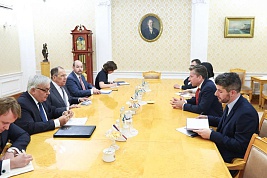RIA NOVOSTI INTERVIEW WITH RUSSIAN FOREIGN MINISTRY SPOKESMAN ALEXANDER YAKOVENKO AHEAD OF UPCOMING MEETING OF G8 FOREIGN MINISTERS
Q.: What impact may the latest world developments have on the upcoming meeting of foreign ministers of the Group of Eight countries and its outcomes?
A.: The meeting of the G8 foreign ministers, due in Paris on May 22-23, will take place against a complicated international background. On the one hand, relations between the G8 countries have aggravated over the war in Iraq. On the other hand, the scale and gravity of a series of global problems call for this influential club's members to join hands and take intensive actions together.
It is therefore important to take the fullest advantage of this informal international club's potential to bring the member-countries' approaches closer together, to restore trust between the leaders and search for ways of strengthening the collective arrangements of control over what is going on on the globe.
At the upcoming meeting, Russia is set to act as a constructive partner searching for consensus. The G8 members have more common interests than disagreements, something that helps settle discords in an open and sincere way.
Q.: What issues will dominate the Paris meeting agenda?
A.: The meeting will focus on the key international and regional problems - the non-proliferation of weapons of mass destruction, the anti-terrorist cause, the Iraq problem, the Mideastern settlement, North Korea's reactivated nuclear programme, Afghanistan developments, India-Pakistan relations and other regional issues. The foreign ministers are expected to draft proposals on the above issues to be discussed at a G8 summit in Evian on June 1-3.
The G8 will take advantage of its ministerial-level meetings and summits to bring the Iraqi settlement effort back into the United Nations' channel. The G8's role in Iraq's post-war reconstruction is also to be discussed.
Russia will urge the strengthening of the WMD non-proliferation regimes. This is a topmost objective of the entire global community, since the Iraqi war may trigger an upsurge of terror attacks. The problem must be tackled on the basis on international law, without singling out "rogue" states arbitrarily. Attempts to curb the spread of mass destruction weapons by means of force or by threatening to use force will only trigger a nuclear arms race in increasingly more regions. This is the approach Russia will insist on while discussing the Iran and North Korea problems.
Russia seeks that the Paris and further G8 meetings should be a powerful impetus to the drive against international terrorism. Assistance to third countries in building up their anti-terrorist potential comes to the foreground. Russia has a huge expertise, information and technology in this area, and is eager to share them. The Commonwealth of Independent States and the Shanghai Co-operation Organisation member-countries are, by all means, the area of Russia's particular concern.
Besides, Russia will urge teamwork in settling regional conflicts, where Russia's and its G8 partners' interests coincide in principle. The Russian side will insist that the "road map" plan of the Palestinian-Israeli settlement be made public and start being implemented as soon as possible, with due heed to Palestine's new cabinet approved by Palestinian Parliament.
The Russian side will urge the G8 countries' assistance in persuading Islamabad to clamp down on terrorists' crossing the Control Line, which is crucial for resuming dialogue between India and Pakistan.
Russia is resolved to intensify co-operation within the Group of Eight aiming to foster Afghanistan's statehood and economic revival, to end drug flow from this country.
Possible measures against a new challenge, drug terrorism, which has evolved into a national-scale menace and a grave threat to the neighbouring countries, including Russia, will be discussed.
Q.: Russia's membership in the Group of Eight is, by all means, evidence of its growing influence on the international arena. Which of the Russian leadership's steps have been conducive to this?
A.: The Paris meeting will be held against the background of the general strengthening of Russia's position in the club. Conducive to this are positive economic trends, political stability and public's unequivocal support for the Russian government's foreign policy. The country faultlessly meets its international commitments, including to G8 partners and international lending organisations. Russia will repay $17.3 billion to the creditors this year.
Russia is increasingly perceived as a donor rather than a recipient of aid by the G8 members, which is of principled importance.
In recent months, for one, Russia has transferred $10 million to the Cologne Debt Initiative's Trust Fund and allocated $11 million on the World Food Programme. Earlier, the country had allocated $20 million to the Global Fund to Fight AIDS, TB and malaria.
Russia's contribution to writing off debts of the world's poorest nations needs no comment. It is leading as to such indices as the share of reduced debts in GDP and debt per capita income ratio.

